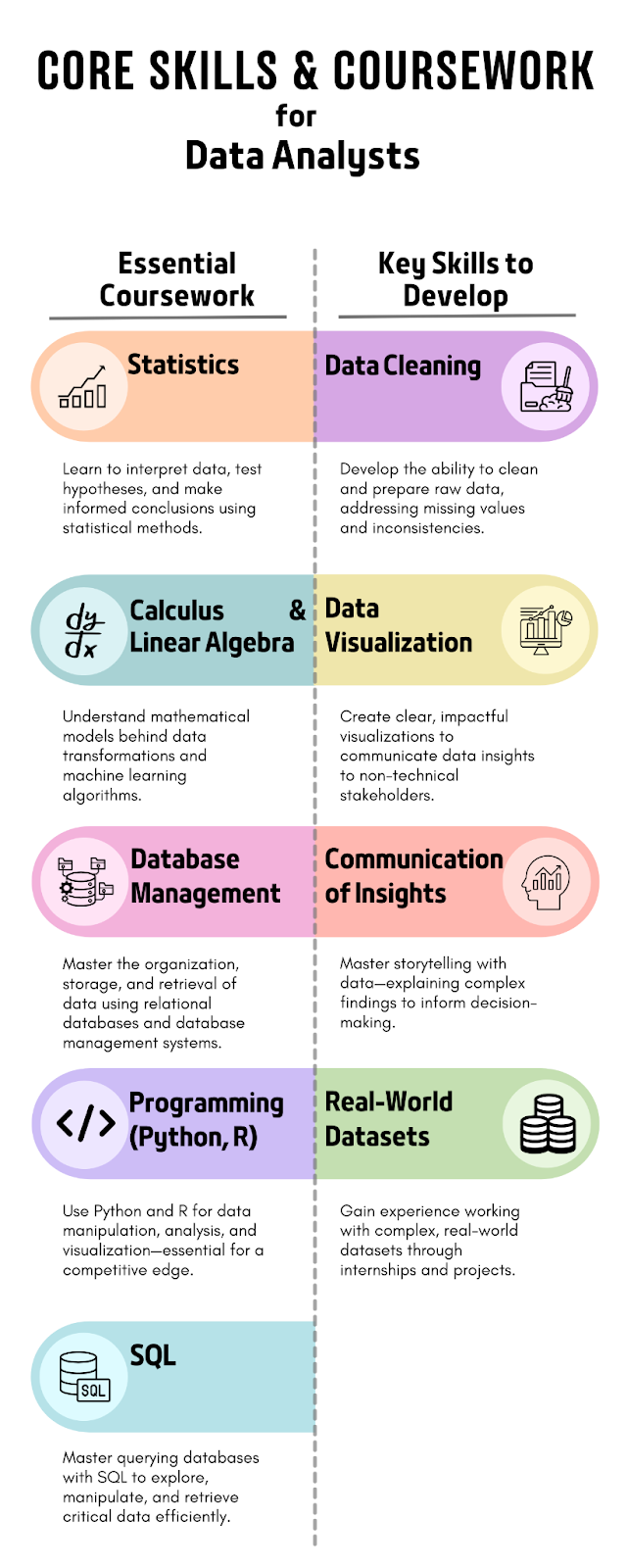Track
Data is a critical asset, and data analysts play a key role in helping organizations make informed decisions. Companies across industries rely on data analysts to make informed business decisions, uncover patterns, and drive growth. But what does it take to become a data analyst, and is pursuing a degree the best route to get there?
This article will guide you through the benefits of obtaining a degree in data analysis, the skills you can develop through formal education, and how to evaluate if a degree is the right choice for you. It will also explore alternative options for entering or advancing in the field without a traditional degree.
Do You Need a Degree to Become a Data Analyst?
One of the most common questions I get from aspiring data analysts is if a degree is necessary. The short answer is: not always. While some roles require a degree, boot camps, certifications, and self-study are viable alternatives. Here is how I think about this:
Consider your background and goals
- Do you have a related degree? If you already hold a degree in fields like data science, computer science, or statistics, you may have the foundational skills required for data analyst roles. Assess how your existing knowledge aligns with job requirements.
- Are you switching careers? If you come from an unrelated field, highlight transferable skills like analytical thinking, problem-solving, and communication—all of which are valuable in data analysis.
Explore alternative pathways
- Boot camps and certifications: These provide a fast, practical way to gain essential skills. Programs from platforms like DataCamp focus on tools like Python, SQL, R, and Power BI, emphasizing hands-on training for real-world scenarios.
- Self-study: Many successful data analysts have built their careers through self-learning. Online tutorials, open-source projects, and professional courses enable you to master key technologies and create a strong portfolio.
Evaluate the job market
- What do employers value? Many employers prioritize practical skills and experience over formal education. Review job postings in your desired industry to identify in-demand qualifications.
- Build hands-on experience: A well-rounded portfolio showcasing your ability to analyze data, draw insights, and present findings can often be as impactful as a degree. Focus on projects that demonstrate your expertise and problem-solving abilities.
Make an informed decision
While a degree can open doors, it’s not the only pathway to becoming a data analyst. Whether you pursue a traditional degree program or opt for alternative routes like boot camps and self-study, focus on developing practical skills and gaining real-world experience. Most importantly, your decision should align with your personal goals, resources, and career aspirations.
Best Degrees for Aspiring Data Analysts
If pursuing a degree aligns with your career goals, choosing the right one is very important. The field of data analysis is diverse, and your degree choice can influence your career trajectory. Below are some of the most relevant degrees for aspiring data analysts and the unique benefits they offer:
- Data Science: A Data Science degree covers data management, statistics, and machine learning, preparing students for tasks like data cleaning, analysis, and predictive modeling.
- Computer Science: A Computer Science degree emphasizes programming, algorithms, and computational theory. It’s an excellent choice for aspiring data analysts who want to automate data collection or work with large-scale systems.
- Quantitative fields (Statistics/Applied Mathematics, Finance/Economics): Degrees in Statistics or Applied Mathematics provide strong analytical capabilities through statistical and mathematical modeling. Finance and Economics degrees equip students to create forecasts and develop strategies using financial data.
- Management Information Systems (MIS): MIS degrees blend technical and business knowledge, covering data analytics and systems analysis. They are ideal for understanding both technical and organizational contexts of data use.
Coursework and Skills to Focus On
The courses and skills you focus on during your studies are critical for building a successful career in data analysis.

Core Skills and Coursework for Data Analysts. Image by Author
Here are the key areas to prioritize:
Essential courses
- Statistics: Interpret data, test hypotheses, and draw meaningful conclusions.
- Mathematics: Learn calculus and linear algebra for algorithms and data transformations.
- Database management: Learn to store and query data using SQL.
- Programming: Gain expertise in Python and R for data manipulation and analysis.
- Data visualization: Use tools like Tableau, Power BI, or Matplotlib to present insights effectively.
Skills to develop
- Data cleaning: Master techniques to address inconsistencies and prepare raw data for analysis.
- Communication: Develop storytelling and presentation skills to effectively share insights.
- Statistical thinking: Build a strong foundation in statistics to interpret data patterns, identify trends, and draw reliable conclusions.
The Value of a Degree in Data Analytics
A degree in data analytics can significantly impact your career by offering advantages in job opportunities, earning potential, and career progression. Here’s how:
Advancing your career
- Structured learning: Degrees provide a systematic way to acquire essential skills.
- Networking opportunities: Degrees help you connect with peers and industry professionals to expand career prospects.
- Path to senior roles: Degrees often lead to higher earning potential and access to leadership positions, such as analytics managers or data scientists.
Meeting job market demand
- Bachelor’s degrees: Suitable for entry-level roles, providing foundational skills in data analysis, programming, and visualization.
- Master’s degrees: Sometimes needed for advanced positions, offering specialized knowledge and a competitive edge.
A degree is valuable, but practical skills and experience are essential for success.
Alternative Paths to a Data Analyst Career
Many professionals transition into data analysis without a formal degree through certifications and boot camps. These pathways offer focused, practical training that equips you with the essential skills for the role in a shorter time frame. Both certifications and boot camps provide hands-on learning, flexible schedules, and opportunities to build a portfolio with real-world projects, making them excellent options for career switchers or those looking to upskill.
Certifications validate your skills with self-paced programs that balance well with job commitments, while boot camps offer more intensive, fast-paced training with career support such as resume reviews and job placement assistance.
Build a portfolio
Regardless of pursuing a certification or attending a boot camp, building a strong portfolio is key to demonstrating your skills. Public datasets from resources like Kaggle, and Google Dataset Search provide ample opportunities to practice analyzing real-world data and applying the skills you've learned. Additionally, platforms like DataLab offer an AI-powered data notebook that allows you to derive insights from your datasets.
Focus on industries like finance, healthcare, or retail when creating your projects. A solid portfolio showcasing your ability to turn raw data into actionable insights is often more important than a degree.
Grow your network
To succeed as a data analyst without a degree, focus on building a strong portfolio and networking. Work on personal projects using publicly available datasets, earn certifications in tools like SQL, Python, and Power BI, and showcase these in your portfolio. Networking through platforms like LinkedIn, attending meetups, and customizing your job applications are key strategies. Your portfolio should highlight practical skills, real-world problem-solving, and your ability to generate actionable insights, which are highly valued by employers.
Focus on practical skills
While rankings of data analyst degree programs can offer some guidance, what truly matters to employers is the practical skills and experience you acquire. Programs that teach essential tools like SQL, Python, R, and Power BI, and offer hands-on projects, are important. Focus on developing these competencies, regardless of the program's ranking, to stand out in the competitive field of data analysis.
Where a Data Analyst Degree Can Take You
A degree in data analytics opens doors to various career opportunities across industries. Tech, healthcare, finance, retail, and manufacturing are all in need of skilled data analysts. Graduates can pursue roles such as business analysts, data scientists, financial analysts, and marketing analysts.
Salaries vary by industry, degree level, and location, with those holding a bachelor's degree earning between $55,000 to $75,000, and those with a master's degree typically earning between $75,000 to $100,000. Tech and finance roles offer higher salaries, but sectors like healthcare and retail also offer competitive compensation. I’m painting with a broad brush here. Read our Data Analyst Salaries Around the World blog post to better understand salary bands by region and level of experience.
Final Thoughts
There are multiple paths to becoming a data analyst, each offering unique advantages. Whether you pursue a degree, certifications, or a boot camp, success depends on one key factor: developing practical skills to solve real-world problems.
A good way to both learn by doing and also showcase your skill is through our Data Analyst Certification. I would pare this work with other great resources we have, such as our webinar on How to Become a Data Analyst, which offers details into our associate and professional certifications and ideas on career growth.
Experienced data professional and writer who is passionate about empowering aspiring experts in the data space.
FAQs
Do you need a degree to be a data analyst?
No, a formal degree is not strictly necessary to become a data analyst. Many employers value practical skills and experience over formal education, especially in areas like SQL, Python, and data visualization.
What is the best degree for a data analyst?
Degrees in fields like data science, computer science, statistics, economics, and business analytics are commonly pursued by aspiring data analysts.
Can certifications help in becoming a data analyst?
Yes, certifications can be very beneficial, especially if you are entering the field without a degree.



